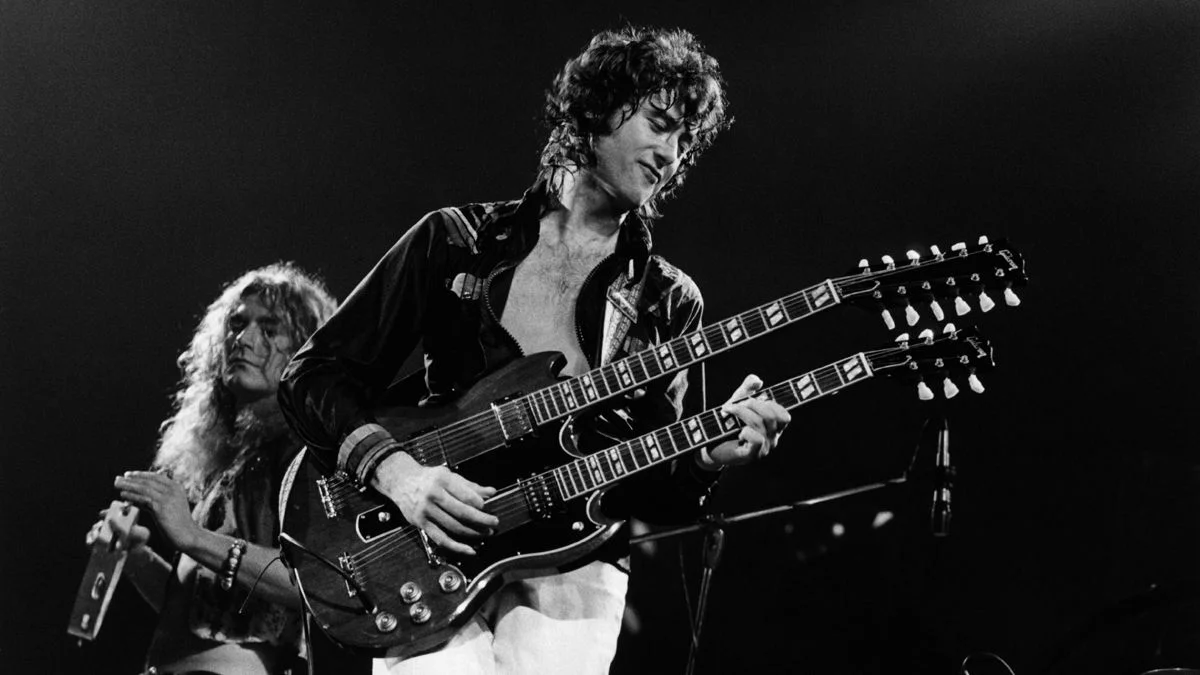Trying to pin down Jimmy Page in a few lines is like chasing lightning in a bottle — unpredictable, electric, and full of force. He’s not just a guitarist; he’s a sonic architect, a composer, and a rebel with a vision. If one word must capture him, it would be versatile.
Early Days and the Session Room School
James Patrick Page was born on January 9, 1944 in Heston, Middlesex, England.
When he was eight, his family moved to Epsom, Surrey — and with that move came a serendipitous gift: the previous occupants had left behind a Spanish guitar. Young Jimmy discovered it, taught himself by listening to records (especially blues, rockabilly, and early rock ‘n’ roll), and by his mid teens he had already chosen music over school.
In the early 1960s, Page cut his teeth in the London music scene, first joining small local bands and then becoming a top session guitarist. He played on dozens of recordings across genres — pop, blues, orchestral pop, folk — absorbing styles, techniques, and tonal ideas.
This “session room schooling” gave Page a musical flexibility few musicians enjoy.
In 1966, he joined the Yardbirds, replacing Eric Clapton.
Wikipedia
But when the Yardbirds folded in 1968, Page didn’t just look for another band — he built one from scratch: Led Zeppelin.
Light & Shade: A Musical Philosophy
From the beginning, Page had a concept: music should breathe. He loved the idea of contrast — light and shade — where songs could shift from whisper-quiet acoustic moments to full-throttle rock bombast. In Led Zeppelin’s catalog, you hear this constantly: the heavy riffs and thunderous drums of “Black Dog” or “Immigrant Song,” but also the fragile fingerpicked lines in “Going to California” or the folk-inflected “Tangerine.”
Page treated the guitar like an orchestra. He layered leads, countermelodies, ambient textures, alternate tunings, and even used a violin bow on strings to get weird, sustained sounds.
Of course, he didn’t do it in isolation. John Bonham supplied drum power, John Paul Jones brought multi-instrumental skills and arranging means, and Robert Plant’s voice — unbound, wide-rangy, expressive — allowed Page to roam wherever his imagination led. Together, they became more than a band — a musical force.
After Bonham’s tragic death in 1980, Led Zeppelin was done. But Page’s curiosity never stopped. He worked with different artists, reformed collaborations, and continued pushing new ideas.
The Meeting with Jeff Buckley: A Kindred Spirit
One of the most touching stories from Page’s later years involves Jeff Buckley, whose music caught his attention in the 1990s. Buckley’s 1994 album Grace fascinated Page — he began playing it constantly.
Page said it was “scary” to see Buckley perform live, because Buckley’s control, intensity, and emotional range were so powerful.
A touching anecdote: backstage after one gig, a friend of Buckley’s claimed that they cried when they first met — Page reportedly saw his own voice in Buckley, and Buckley was meeting his idol.
Buckley even invited Page to work with him on his next album. Sadly, they never got to do so — Buckley died in 1997.
That meeting stands as a symbolic link across generations: Page, the architect of modern rock, recognizing in Buckley someone who also refused to be boxed in.
Legacy, Contrasts & Shadows
Jimmy Page is widely considered one of rock’s greatest guitarists. Rolling Stone placed him at #3 among living guitarists; Gibson ranked him near the top of its all-time list.
He was inducted into the Rock & Roll Hall of Fame twice — once with the Yardbirds (1992), once with Led Zeppelin (1995).
Wikipedia
Yet Page is also a figure of contradiction. He is notoriously private, sometimes mystic, and his fascination with occult ideas (especially his ownership of properties once associated with occultist Aleister Crowley) has fueled much speculation.
Critics also point out that parts of his story — especially around credits, influences, or events in Zeppelin’s history — are murky or debated.
Maybe that’s fitting. Page’s music thrived on light and shade — moments of clarity and moments of mystery. He wanted listeners to feel surprised, unsettled, thrilled, and moved — all in one album, one set, one note.

